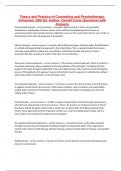Theory and Practice of Counseling and Psychotherapy,
enhanced, 10th Ed. Author: Gerald Corey Questions with
Answers
Psychoanalytic therapy - correct answers>>>Founder: Sigmund Freud. A theory of personality
development, a philosophy of human nature, and a method of psychotherapy that focuses on
unconscious factors that motivate behavior. Attention is given to the events of the first six years of life as
determinants of the later development of personality.
Adlerian therapy - correct answers>>>Founder: Alfred Adler. Key Figure: Following Adler, Rudolf Dreikurs
is credited with popularizing this approach in the United States. This is a growth model that stresses
assuming responsibility, creating one's own destiny, and finding meaning and goals to create a
purposeful life. Key concepts are used in most other current therapies.
The person-centered approach - correct answers>>>The person-centered approach, which is rooted in a
humanistic philosophy, places emphasis on the basic attitudes of the therapist. It maintains that the
quality of the client-therapist relationship is the prime determinant of the outcomes of the therapeutic
process. Philosophically, this approach assumes that clients have the capacity for self-direction without
active intervention and direction on the therapist's part.
The existential approach - correct answers>>>It stresses a concern for what it means to be fully human.
It suggests certain themes that are part of the human condition, such as freedom and responsibility,
anxiety, guilt, awareness of being finite, creating meaning in the world, and shaping one's future by
making active choices.
Gestalt therapy - correct answers>>>It offers a range of experiments to help clients gain awareness of
what they are experiencing in the here and now—that is, the present. In contrast to person-centered
therapists, Gestalt therapists tend to take an active role, yet they follow the leads provided by their
clients. These approaches tend to emphasize emotion as a route to bringing about change, and in a
sense, they can be considered emotion-focused therapies.
the cognitive behavioral approaches - correct answers>>>sometimes known as the action-oriented
therapies because they all emphasize translating insights into behavioral action. These approaches
include choice theory/reality therapy, behavior therapy, rational emotive behavior therapy, and cognitive
therapy.
Reality therapy - correct answers>>>focuses on clients' current behavior and stresses developing clear
plans for new behaviors.
, behavior therapy - correct answers>>>Like reality therapy, behavior therapy puts a premium on doing
and on taking steps to make concrete changes. A current trend in behavior therapy is toward paying
increased attention to cognitive factors as an important determinant of behavior.
Rational emotive behavior therapy and cognitive therapy - correct answers>>>highlight the necessity of
learning how to challenge inaccurate beliefs and automatic thoughts that lead to behavioral problems.
These cognitive behavioral approaches are used to help people modify their inaccurate and self-
defeating assumptions and to develop new patterns of acting. (Remember conditional assomption: if x
happens, then...)
The systems and *postmodern perspectives*.
Feminist therapy and family therapy are systems approaches - correct answers>>>External reality. The
systems orientation stresses the importance of understanding individuals in the context of the
surroundings that influence their development. To bring about individual change, it is essential to pay
attention to how the individual's personality has been affected by his or her gender-role socialization,
culture, family, and other systems.
ego strength (or his ability to manage life realistically) - correct answers>>>ability of the ego to
effectively deal with the demands of the id. Ego and supergo, those with little ego strength may feel torn
between competing depends while those with too much can become rigid.
Value imposition - correct answers>>>refers to counselors directly attempting to define a client's values,
attitudes, beliefs, and behaviors. It is unethical for counselors to impose their values in the therapeutic
relationship. The American Counseling Association's (ACA, 2014) Code of Ethics is explicit regarding this
matter:
Personal Values. Counselors are aware of—and avoid imposing—their own values, attitudes, beliefs, and
behaviors. Counselors respect the diversity of clients, trainees, and research participants and seek
training in areas in which they are at risk of imposing their values onto clients, especially when the
counselor's values are inconsistent with the client's goals or are discriminatory in nature. (Standard
A.4.b.)
Countertransference - correct answers>>>defined broadly, includes any of our projections that influence
the way we perceive and react to a client. This phenomenon occurs when we are triggered into
emotional reactivity, when we respond defensively, or when we lose our ability to be present in a




